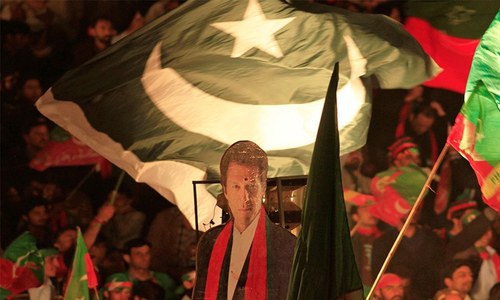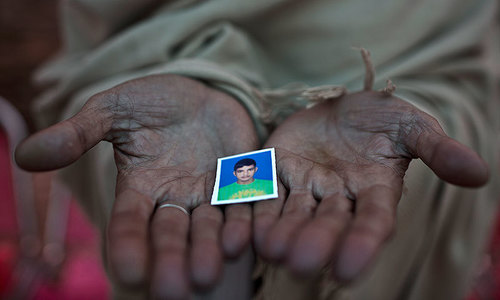One man's terrorist... The tragicomedy of Pakistan's apologists

Pakistan Tehreek-i-Insaf (PTI) spokesman Naeemul Haque on Thursday defended his stance over calling Afghan militant Mullah Mansour a 'martyr', who was killed in a US drone attack in Balochistan last week.
"Fighting to liberate your homeland is a just cause," Naeem told Dawn.com, a day after he spoke on a TV show and called the head of an outlawed group a 'martyr'.
This should also mean that Mr Haque finds the violence associated with the group equally liberating and just?
Also, exactly how is it any less liberating and just than the one related to similar groups within Pakistan. Groups which are now locked in a mortal tussle with the military and the government of Pakistan.
Men such as Mr Haque and many like him really can't be expected to think about such issues beyond the stuff which can only gain them an instant headline or two.
Also read: Did Hamza Ali Abbasi just thank the Afghan Taliban?
On the other hand, many other more thoughtful men and women have wondered what makes a perfectly normal looking person take a life (or lives) and sometimes his own; secure in a rather convoluted knowledge that his act is sure to place him in the good books of the Almighty or find him pleasurably loitering in the gardens of paradise.
Sociologists, psychologists and political scientists have all often come up with various explanations. Some suggest that bad economics is to be blamed for young people to become desperate enough to be exploited by the violent patrons of faith and go on a killing spree for money as well as God.
But then, there are also those who remind us that if it was all about economics, how would one explain acts of faith-driven terror undertaken by young men and women from well-to-do middle-class families?
Faisal Shahzad, Omar Saeed Sheikh, the 7/7 bombers in the UK, the men behind the gruesome Safoora Goth massacre — all of these came from educated, urban and middle-class families.
In such cases, it is believed that the mad urge to kill in the name of faith transcends political and economic compulsions and becomes a sheer act of criminal psychosis.
... another man's freedom fighter
What gets missed in this context is the role played by those 'non-violent' men and women in politics, media and the academia who actually end up somewhat justifying (if not entirely applauding) certain violent acts of men they believe are a product of bad economics, injustice and some kind of a noble war.
Also read: Understanding the new militants of Pakistan
Such people who can emerge from both the right, as well as left sides of the conventional ideological divide are usually called apologists.
Funny thing is that when pressed to describe a person who has no qualms about strapping a suicide belt around his waist and then blowing himself up in a crowded mosque, a Sufi shrine or a congested market buzzing with men, women and children, the apologist would often strike a pose of the unbiased and objective thinker to suggest: You see, one man's terrorist can be another man's freedom fighter.'
How convenient.
What needs to be looked at and studied is the impact apologists are having on a society in turmoil.
Yes, bad economics and the vulnerability of faith to be exploited in the most violent manner is making many faithfuls actually sully the idea of the Almighty by committing unabashed acts of terror in His name.
But maybe such deluded souls are also finding justification from those who refuse to call them out, or go on to explain their ideas of glory as a reflection of some noble cause.
Take a look: Anatomy of an apologist: A double-act play
But the absurd ways of the apologists are such that they often turn into becoming tragicomedies.
Iran's torched glory
Back in the late 1970s, just before the revolution that toppled the all-powerful Shah of Iran, segments supporting Iranian spiritual leader, Ayatollah Khomeini, began finding the act of torching cinemas a rather glorified act.
Hundreds of cinemas were torched in Iran between 1978 and 1979, but only when there were no crowds inside the cinema halls. Iranian intellectuals and leaders who were supporting the anti-Shah clergy, instead of condemning the act of burning down public property, explained it as an attack on the symbols of the Shah's regime.
But the glory of torching 'symbols of the Shah regime' soon turned gory.
Hosien Takbali — a young drug addict from the Iranian city of Abadan — was buying and selling drugs on the streets of his hometown when his family and friends intervened and convinced him to travel to Isfahan and get admitted to a drug detox centre run by a religious organisation there. He did just that. The revolution against Shah was intensifying when young Takbali was in recovery.
Since this was also a time in Iran when religious, as well as leftist ideas were enthusiastically being absorbed by the country's middle and lower middle classes, Takbali was encouraged by three other young men at the detox centre to supplement his recovery with the study of his faith, which he was told he had neglected.
When Takbali returned to Abadan, he came back as a man who had kicked his addiction and had become pious. Nevertheless, he retained his love for movies, but unfortunately, these were the days when cinemas were going up in flames in Iran — an act applauded and rationalised by even the most educated anti-Shah members of the society.
In August 1978, Takbali's three new friends visited him at his home. They came with an issue of a British newspaper in which a few members of the clergy were quoted as saying that cinemas were a way to distract Iranians and make them ignore their religious duties.
Takbali's friends informed him that after being inspired by the way the clergy was explaining the torching of cinemas, they too had decided to set a cinema on fire.
"Everybody is burning down cinemas. But we'll do it in a way that will make us genuine heroes," said one of his friends.
This meant burning down a cinema while it was screening a film and was packed with people.
The young men all bought tickets to an Iranian film called, 'The Deer' at one of Abadan's oldest cinemas, Rex. The hall was packed with men, women and children when Takbali and his friends poured kerosene oil inside the hall and set it on fire. Over 350 people died and were turned into ash. Only a few people survived, including Takbali.
The incident is still considered to be one of the most horrific acts of violence and murder that took place during the turbulent years of the Iranian Revolution.

Of course, the apologists who were praising acts of burning down cinemas previously, now changed track. Fearing a backlash, they began accusing 'agents of the Shah regime' for torching the Rex.
A year after the imposition of Iran's Islamic government, some Iranians demanded an inquiry into the Rex tragedy.
Takbali, who was expecting to be hailed as a hero of the Islamic Revolution, was instead arrested and accused of being an agent of the fallen Shah regime. He was hanged.
The apologists, who had first applauded the burning down of cinemas, hailed the hanging as a great act of Iran's 'Islamic justice'.
Nadeem F. Paracha is a cultural critic and senior columnist for Dawn Newspaper and Dawn.com. He is also the author of two books on the social history of Pakistan, End of the Past and The Pakistan Anti-Hero.
He tweets @NadeemfParacha














































